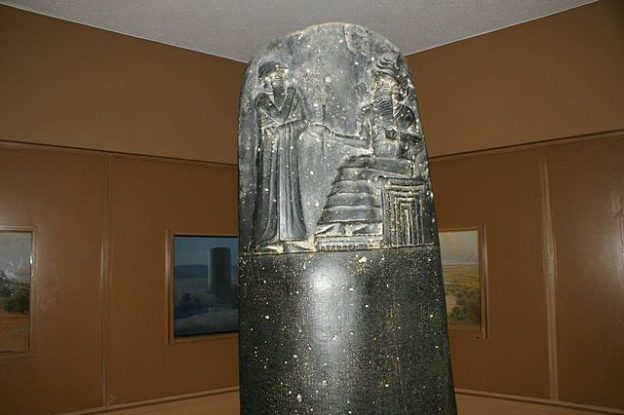One of my favorite novels of the nineties was the “cyberpunk” thriller Snow Crash by Neil Stephenson. (Content warning: not a Christian book.) The most unrealistic element in the book, however, was the posited “true meaning” of the story of the Tower of Babel. In the book’s retelling, humans used to be programmable using something a lot like machine code. Consciousness and free will came about through a virus introduced into the human race at Babel.
To repeat: this was the most unrealistic part of the novel, but it allows conflict as Hiro Protagonist (his real name—the novel doesn’t take itself too seriously) discovers a global conspiracy to reverse the virus and make humans programmable again. I took it as a metaphor for the quest for unity versus the value of freedom despite the social costs.
How Do You Upgrade Human Software?
But recently I’ve been thinking again about this fictional alternative to the Biblical story and the Bible’s own information about how humans are upgraded. After all, at Babel, something like a change in human “software” did miraculously take place. God wiped out a vocabulary and rules of grammar in people’s brains and uploaded new words and grammar rules in their place. The analogy to computer programs isn’t that much of a reach.
But when God called Abram (the story that follows the story of Babel and the scattering of humans into diverse nations), he does so in a way that makes clear that Abram is his “tower.”
And they said to one another, “Come, let us make bricks, and burn them thoroughly.” And they had brick for stone, and bitumen for mortar. Then they said, “Come, let us build ourselves a city and a tower with its top in the heavens, and let us make a name for ourselves, lest we be dispersed over the face of the whole earth.” (Genesis 11:3-4; ESV)
Now the LORD said to Abram, “Go from your country and your kindred and your father’s house to the land that I will show you. And I will make of you a great nation, and I will bless you and make your name great, so that you will be a blessing. I will bless those who bless you, and him who dishonors you I will curse, and in you all the families of the earth shall be blessed.” (Genesis 12:1-3; ESV)
We know from the miracle of Pentecost that God wanted the divisions imposed at Babel to be ameliorated so that a unity could be provided through the Gospel.
But what was the purpose of history between Babel and Pentecost? What was God doing?
Maybe we should ask ourselves how human “software” is normally “installed” or changed. Unlike what some science fiction may lead you to imagine, one can’t change thinking and behavior simply by plugging the brain into a computer. Brains are part of bodies, not machines.
How do people normally acquire language. Outside of the events of the special creation of Adam and Eve and the tower of Babel, we get our language from being immersed in a speaking and acting culture from the time we are born. We learn language not only by listening, or listening and watching, but by bodily interacting with others. We learn through our bodies.
And perhaps that’s the answer. Consider what the Bible tells us about God feeding Israel with manna in the wilderness. He gives them food to gather day by day six days a week. Any attempt to save up for the next day is frustrated because it becomes inedible except on the sixth day. On that day, they can gather for the daily bread and for the seventh day. And on the seventh day no manna appears on the ground.
God didn’t simply tell the people to work six days and rest on the seventh; he trained them to do so.
Israel’s Program: A New Humanity
The bodily training involved in manna is obvious. For decades Israel’s nourishment required six days of gathering in the morning with only the sixth day allowing for saving for the next day. By the time God stopped providing manna there were adults in Israel in their late thirties who had been raised taking a break from manna gathering on Sunday because it wasn’t available then.
Yet, even that simple routine had more implications than just taking a break from one chore. It was intended to change the way they exercised authority over others:
“‘Observe the Sabbath day, to keep it holy, as the LORD your God commanded you. Six days you shall labor and do all your work, but the seventh day is a Sabbath to the LORD your God. On it you shall not do any work, you or your son or your daughter or your male servant or your female servant, or your ox or your donkey or any of your livestock, or the sojourner who is within your gates, that your male servant and your female servant may rest as well as you. You shall remember that you were a slave in the land of Egypt, and the LORD your God brought you out from there with a mighty hand and an outstretched arm. Therefore, the LORD your God commanded you to keep the Sabbath day. (Deuteronomy 5:12-15, ESV)
We can’t know how different it was for a generation to hear that command after a generation of manna-training, but it obviously made some difference. Rituals often have wider implications in a community and in each person.
So, what about the rituals that Israel was given without much explanation?
The LORD called Moses and spoke to him from the tent of meeting, saying, “Speak to the people of Israel and say to them, ‘When any one of you brings an offering to the LORD, you shall bring your offering of livestock from the herd or from the flock.’
“If his offering is a burnt offering from the herd, he shall offer a male without blemish. He shall bring it to the entrance of the tent of meeting, that he may be accepted before the LORD. He shall lay his hand on the head of the burnt offering, and it shall be accepted for him to make atonement for him. Then he shall kill the bull before the LORD, and Aaron’s sons the priests shall bring the blood and throw the blood against the sides of the altar that is at the entrance of the tent of meeting. Then he shall flay the burnt offering and cut it into pieces, and the sons of Aaron the priest shall put fire on the altar and arrange wood on the fire. And Aaron’s sons the priests shall arrange the pieces, the head, and the fat, on the wood that is on the fire on the altar; but its entrails and its legs he shall wash with water. And the priest shall burn all of it on the altar, as a burnt offering, a food offering with a pleasing aroma to the LORD.” (Leviticus 1:1-9; ESV)
It is totally inadequate to say that these sacrifices are pictures of the work of Christ. (The statement would be constructive if it was framed as a confession that we don’t understand much of the work of Christ, but that never happens.) There are details here that are more complex than a simple message of substitutionary atonement.
But more importantly: if the meaning of the sacrifices was simply a theological message about a future event in which God would save believers, why not just verbally communicate that message?
God wanted generations of Israelites to slit animal throats, smell the entrails being cut out, and watch the smoke rise from the altar. He wanted generations of their young children to feel the thrill of terror to learn that they would be required to stand by a bronze altar but be killed if they touched it.
Readers today have a text, but generations of Israelites and visiting foreigners had a network of customs and rituals that they lived out through a cultural tradition.
What would be the effect of centuries of sacrifices, cleanliness rules, dietary requirements, and all the other routines of the Mosaic covenant?
The goal was a new upgraded human being and a new human culture.
See, I have taught you statutes and rules, as the LORD my God commanded me, that you should do them in the land that you are entering to take possession of it. Keep them and do them, for that will be your wisdom and your understanding in the sight of the peoples, who, when they hear all these statutes, will say, “Surely this great nation is a wise and understanding people.” For what great nation is there that has a god so near to it as the LORD our God is to us, whenever we call upon him? And what great nation is there, that has statutes and rules so righteous as all this law that I set before you today? (Deuteronomy 4:5-8; ESV)
This took faith. It was not obvious how banning your wife from Passover because her period came early would be wisdom that was recognized as such by the other nations. But that was the path that God promised would lead to a new level of glory.
And the Bible shows us how it worked out when the tribal confederacy of Israel reached the next stage.
TO BE CONTINUED







